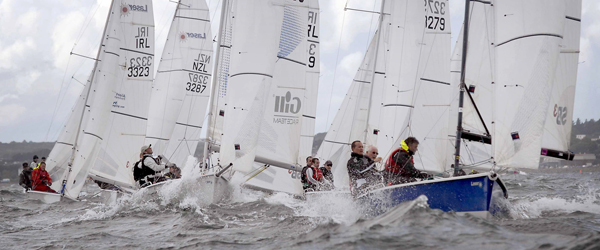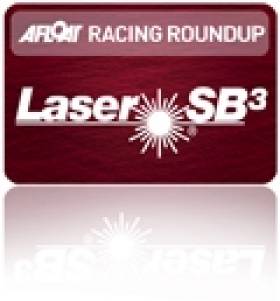Displaying items by tag: SB3 Ireland Western Championships
Galway Bay Event Sets Scene for Nationals decider
With breeze on at nearly every round this year the battle for honours at the front of the SB3 fleet has been compared to a tennis match between McCready Gill Racing and Sharkbait.
The opening salvo of the year took place at the Easterns, hosted by the Royal St George in May,
Galway Bay Sailing Club hosted the latest instalment of this epic battle, the SB3 Ireland Western Championships, over the weekend. The legacy of the city being host to the 2008 Volvo stopover means that, with the addition of a few further basic amenities, Galway is now a first class championship venue. The fleet were hosted by Galway Harbour Company in the docks and clear water out to the west meant the course had superb wave conditions to go with the 20-25kts of breeze. Ideal conditions for ripping it up in an SB3. But for a single 30kt squal the breeze barely wavered all weekend putting boatspeed, technique and fleet management skills to the fore.
Dave Quinn and the crew of Investwise have been in increasly fine form at HYC so it was no surprise to see them storm off the line to round the first windward mark in the lead. Sharkbait looked to follow them but badly misread the tide and had to eject out below the windward mark eventually rounding 6th with McCready Gill Racing in 4th. The first helterskelter run of the weekend followed with the entire fleet powering down the run under A-sails at the bottom of which Sharkbait pulled through the last couple of boats to take the lead on the drop. From there they eased away to a comanding lead whilst back in 3rd McCreadys spun out at the final gate (caught on camera for the entertainment of the masses in the bar that evening) and went wide of the gate. Once they realised their error they retired from the race leaving Investwise a comfortable 2nd with Lia in third followed by Belfast Kitchens and Duff Beer in 4th and 5th.
In the second race the trio including Loch Derg stalwarts Geoff O'Donoghue and Michael McCarney launched out of the left and into an early lead closely followed by Ronan Downing in Profile Park. But the pack slowly hunted them down with Sharkbait taking their second win, followed by the McCreadys. Profle Park held on for 3rd followed by Belfast Kitchens and Lia.
In the third and final race of the first day Sharkbait jumped clear off the first line with a significant bias to take up a controlling position. Marking the fleet most of the race they let slip at the top half to let Peter Kennedy through. PK, Tom Molloy and Peter Mackel on Belfast Kitchens sailed up the beat to round first with inches to spare. Down the run the McCreadys belted out to the left hand side of the run while the two leaders headed off neck and neck down the right. Belfast Kitchens held their own with Sharkbait down the run leaving a frantic pressure drop from both boats at the leeward gate. Bow vs bow to get the kites down and under control it was honours even as Sharkbait closed to within inches of Belfast Kitchen's stern before being ready to tack off. Both boats crossed tacks half way up the final beat with Belfast Kitchens having extended to a 2 boatlength lead. Both teams worked their boats for all they were worth and the finish was greated with celebration on the Northern Irish boat as they took the pin end line bias for a win by feet to serve notice that they will be there to defend their National title come September. Discount them at your peril. McCready Gill Racing came 3rd with Sean Craig, Stephen Boyle and Alan Green in Yeti making their first appearance at the front of the fleet this year from Profile Park.
With the lock gates firmly closed until 1pm on Sunday full advantage was taken of the Captains Morgans sponsorship at McSwiggans Bar in the evening. As the poster said 'we're off the edge of the map now lads, here be monsters!'.
On Sunday afternoon a steady 18-20kts westerly welcomed the competitors back to the race course. Despite enjoying all that Galway has to offer for the evening Dave Barry wiggled Lia up the first beat to round first, followed by Sharkbait and McCready Gill Racing. All the Lake Garda practice paid off when their kite went up with a wrap. they gybed off smartly undoing the wrap and holding 3rd to the end of the race. Sharkbait powered away to an early lead down the run with the McCreadys' hot on their heels and an early drop closed the race right back up again. Patrolling the middle of the course up the second beat Sharkbait took a 10 boatlength lead into the final run which they extended to 15 boat lengths before wiping out in the final gybe of the race. All the advice on broach recovery came in handy and but by the time the kite was back up the mast McCready Gill Racing where hot on their heels. Perfect drops from both boats at the gate and a game of tack and cover to the line saw the Howth team home for their 3rd bullet sewing up the event. Game Sharkbait.
In the 5th and final race McCready Gill Racing tidied up 2nd place overall with a race win from Dinghy Supplies, Monkey, Duff Beer and Yeti.
Photograph below by Olivier Bauduin






























































